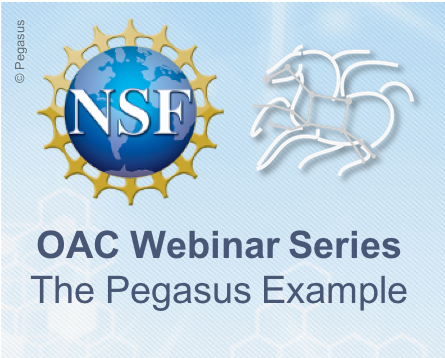
Dr. Deelman was invited to kick off the National Science Foundation (NSF) Office of Advanced Cyberinfrastructure (OAC) 2018 monthly webinar series.
OAC – CI Webinar Series Theme and Purpose: The 2018 webinar series will focus on the translational impact of Advanced Cyberinfrastructure and will highlight how cyberinfrastructure innovations have impacted science. The series will also explore emerging science needs and cyberinfrastructure challenges and opportunities for an integrated cyberinfrastructure ecosystem.
OAC’s overarching mission is to conceptualize, design, and implement advanced cyberinfrastructure that is critical to the advancement of all areas of science and engineering research and education. For over a decade, OAC has funded and coordinated exploration, development and provisioning of advanced cyberinfrastructure resources, facilities, and services. OAC’s investments span advanced computing, networking and cybersecurity, software, and data-focused cyberinfrastructure, as well as cross-cutting research and education programs.
Title: Science Impact of Sustained Cyberinfrastructure: The Pegasus Example
Presenter: Dr. Ewa Deelman, University of Southern California
Abstract: The recent multi-messenger observation triggered by LIGO and VIRGO’s first detection of gravitational waves produced by colliding neutron stars is a clear display of the increasing impact of dependable research cyberinfrastructure (CI) on scientific discovery. Today’s cyberinfrastructure—hardware, software, and workforce—underpins the entire scientific workflow, from data collection at instruments, through complex analysis, to simulation, visualization, and analytics. Besides supporting large facilities such as LIGO, it also provides the educational and research platform for numerous projects, individual researchers and students.
The effort to develop, sustain, and maintain dependable CI is thus a key element in the modern scientific ecosystem. However, it is not developed in vacuum; rather, it benefits from advances in Computer Science and provides a unique laboratory for Computer Science research. Grounded in the challenging and ever-increasing needs of a multitude of scientific applications, it is continuously enhanced and driven to innovate.
The Pegasus project in an example of a cyberinfrastructure effort that enables LIGO and other communities to accomplish their scientific goals. It delivers robust automation capabilities to researchers at the Southern California Earthquake Center (SCEC) studying seismic phenomena, to astronomers seeking to understand the structure of the universe, to material scientists developing new drug delivery methods, and to students seeking to understand human population migration. An example of societal impact is SCEC’s use of Pegasus to generate the world’s first physics-based probabilistic seismic hazard map that provides insight into why earthquakes in the Los Angeles basin can be so destructive. This information can inform civil engineering practices in the area.
This talk describes the challenges of developing and sustaining cyberinfrastructure capabilities that have impact on scientific discovery and that innovate in the changing cyberinfrastructure landscape.
Bio: Ewa Deelman received her PhD in Computer Science from the Rensselaer Polytechnic Institute in 1998. Following a postdoc at the UCLA Computer Science Department she joined the University of Southern California’s Information Sciences Institute (ISI) in 2000, where she is serving as a Research Director and is leading the Science Automation Technologies group. She is also a Research Professor at the USC Computer Science Department and an IEEE Fellow.
The USC/ISI Science Automation Technologies group explores the interplay between automation and the management of scientific workflows that include resource provisioning and data management. She pioneered workflow planning for computations executing in distributed environments. Her group has lead the design and development of the Pegasus Workflow Management software and conducts research in job scheduling and resource provisioning in distributed systems, workflow performance modeling, provenance capture, and the use of cloud platforms for science.
Link to Webinar at OAC Webinar Series
4,041 views